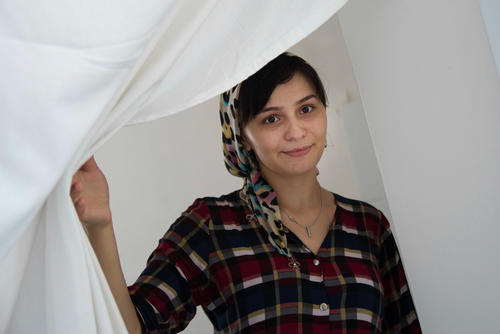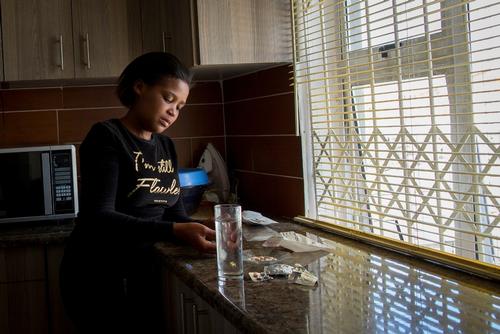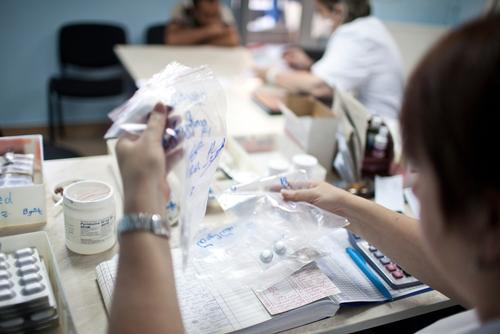- The first new drugs to be developed in 50 years were the last chance for some people with extensively drug-resistant tuberculosis (XDR-TB) in the Chechen Republic of the Russian Federation.
- In 2015, MSF’s Maria Borshova spoke to patients who had just started their new two-year-long treatments. She recently met them again.
Médecins Sans Frontières (MSF) has run a tuberculosis (TB) treatment programme with the Chechen Ministry of Health since 2004. Over the years the programme covered different aspects of TB diagnostics, treatment, laboratory services and health education, as well as adherence counselling and psychosocial support for patients and their families.
The crucial moment in the programme’s history was marked when bedaquiline and delamanid, the first new TB drugs to be developed in nearly 50 years, became available. In 2014, MSF managed to bring these drugs to the project and start patients with extensively drug-resistant tuberculosis (XDR-TB) on new treatment regimens.
Since then, 156 patients involved in our TB programme in Chechnya have been put on treatment regimens containing bedaquiline, delamanid, or a combination of both. Most of them had been left with no other treatment options and probably would not have survived. MSF is so far seeing patients with very promising outcomes: Tamerlan, Khavani and Movsar are among them.
Tamerlan, a power engineer: “This new treatment is much easier to tolerate”
When I first met Tamerlan back in 2015, he was 43. He looked exhausted. He was serious and pensive, but quite open to sharing his thoughts and experience. You could tell by his speech he was well educated and he told me he had a degree in radio engineering. Tamerlan was diagnosed with TB in prison in 1998. He underwent treatment in the prison hospital. Prison and war have been part of the stories of many of our patients here.
“People avoid those with TB, they’re afraid of them,” he told me. “But that is wrong.”
Later, Tamerlan had recurrence. After being diagnosed with XDR-TB in 2015, he was started on a new treatment regimen containing bedaquiline in MSF’s programme. He was clearly determined to complete the treatment although he understood the challenges.
“It’s important that new, effective drugs are developed and that the treatment course is shorter and comprises fewer pills,” he said.
Two years later, we meet in the same hospital, where he has come for a follow-up check. In two months, he will complete his treatment.
“It appears I’d been carrying this disease within me for 17 years,” says Tamerlan, who is now employed as a power engineer, a job he loves.
“Once you are cast down – that’s it. You should get treated, take your medicines. This new treatment I’ve been taking for the last two years is much easier to tolerate than what I was given before.”

Khavani, a mother of three: “You need a goal and patience; I did it for my children”
For Khavani, a young mother of three, TB has been a family tragedy, as she lost her mother to the disease. Her sister and brother were also infected but completed their treatments.
Khavani was diagnosed with TB in 2003 and had recurrence ten years later, after her third child was born. She was diagnosed with pre-XDR-TB, a form of the disease that is resistant to the most effective first-line TB drugs and one of the two groups of second-line drugs. She became MSF’s first patient in Chechnya to be put on a treatment regimen containing delamanid.
I tried to visit her when she started the treatment, but she was too weak. I waited a couple of days until the doctors told me I could meet her. The 24 year-old, who looked like a fragile teenager, told me she was feeling much better since starting the new treatment. She believed it would help her.
Two years later, Khavani has gained 18 kilos and looks radiant. She’s about to complete her treatment and is preparing for an important occasion: her eldest daughter is six and will be starting school this year.
“I couldn’t believe this day would come,” she says excitedly.
She explains how she got through the treatment. “The main thing is to have a goal in life. I did it for my children. It’s so hard to live without a mum – my mum died of TB,” she says, unable to hold back her tears.
“You need a goal and patience. Of course it’s difficult, but you should keep going.”
Movsar, a former humanitarian worker: “The most important thing is to believe you will be cured”
Movsar, from Novye Atagi village in Chechnya’s Shali district, was one of the first MSF patients there to undergo treatment with bedaquiline. In 2010, he was diagnosed with TB, in 2011 with multidrug-resistant tuberculosis and, in July 2014, with XDR-TB.
In August 2014, he was started on a new treatment regimen. Movsar was also treated for diabetes, with MSF providing test stripes to check his sugar level and medications.
When I met him at the hospital in 2015 he seemed calm and patient. He had a warm but somehow sad smile on his face.
“I was told that if I followed treatment, I would be cured,” he said. “So I tried to follow treatment strictly. I took medicines, I had intravenous fluids. These pills had very strong side effects. I have diabetes and heart problems, so there’s a whole bouquet of illnesses. The bedaquiline was very difficult to tolerate at first, but after a month or two it was OK.”
Movsar said the MSF counsellors helped him a lot.
“I was able to ask all kinds of questions and they would explain everything,” he explained.
Movsar had known MSF since the war times. In the early 2000s, he worked for another relief organisation assisting people who had fled Chechnya to the neighbouring republic of Ingushetia. “Those were difficult times then,” he says.
“A lot of organisations worked there, they helped, but still it was hard – it was the war after all.”
Movsar successfully completed his treatment in August 2016. Now 51, he lives together with his big family in their village.
“At home, it’s better than in the hospital, of course,” he says. And although Movsar thinks the current treatment for XDR-TB takes too long, he’s positive that a solution will be found.
“Those who were on treatment with me in the hospital are all fine now,” he says. “The most important thing is to believe that you will be cured. A lot depends on the belief. They will think of something to find a cure for this.”
Tuberculosis (TB) kills around 1.6 million people a year and was recently declared the deadliest infectious disease in the world. It is particularly threatening and hard to treat in its drug-resistant forms. Multi-drug resistant TB and extensively drug resistant TB take substantially longer to treat than ordinary TB, and require the use of second-line TB drugs, which are more expensive and have more side-effects than the first-line drugs used for drug-susceptible TB. For years lack of research into new effective TB drugs had been an issue of special concern for health practitioners.
The two newer drugs have been available for the last five years and represent a potential lifeline for people affected with the most resistant forms of TB. Yet, globally less than 5% of those people in need have actually received them by the end of 2016. Moscow is set to host WHO global Health Minister-level meeting on TB this month where MSF will be calling out on governments to step up and increase access to TB diagnosis and treatment including newer TB treatments.





